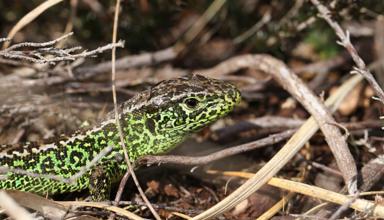56% of UK species studied have declined over the past 50 years, according to the recently published State of Nature Report 2016. The findings of the report, which is a stocktake of native wildlife in the UK, will be debated in Plenary on 9 November.
The report builds on the inaugural State of Nature Report 2013 (PDF 6.93MB) and is a collaboration of 53 organisations including the RSPB, Wildlife Trusts, National Trust, WWF, Woodland Trust and the Marine Conservation Society. A separate Welsh Report (PDF 2.80MB) has also been published.
The State of Nature Report, produced by NGOs, should not be confused with the recently published State of Natural Resources Report (SoNaRR) which is Natural Resources Wales’s statutory publication, which assesses natural resources in Wales.
Key findings
In the UK…
- 56% of species studied have declined across the UK over the last 50 years including hen harriers and basking sharks;
- More than 1/3 of (known) marine vertebrate and plant life has diminished, with 3/4 of marine invertebrates declining across the UK;
- 1 in 10 of the 8,000 UK species assessed are under threat of disappearance; and
- 7,500,000 volunteer hours go into monitoring the UK’s wildlife every year.
In Wales…
- One in 14 species is heading for extinction including the corn bunting and turtle dove (both of which are priority species in Wales- listed under Section 7 of the Environment (Wales) Act 2016);
- Over the long term (1970-2013) 57% of wild plants, 60% of butterflies and 40% of birds are in decline; and
- For Welsh priority species, 33% of those assessed are classified as declining over the last decade, 43% are classified as stable/little change and for 24% the outlook has improved.
Drivers of change
Authors of the report indicate that this is the first time experts have been able to identify and quantify the main drivers of change to UK’s wildlife. Intensive agricultural practices and climate change in particular have resulted in habitats being lost, soils becoming depleted and an increase in flood and drought impacts.
Measuring the environment’s ability to support society
A new analysis is presented in the report, the ‘Biodiversity Intactness Index’ (BII), which assesses the health of the natural environment in 218 countries. A BII score below 90% is thought to represent an ecosystem that can no longer support the needs of society, or nature. Wales scored 82.8%, Scotland 81.3%, England 80.6% and Northern Ireland 80%. Whilst ranked the best in the UK, Wales is in the bottom 20% of the 218 countries.
Success stories in Wales
The Welsh report highlights a range of successful conservation projects including the pearl-bordered fritillary butterfly project, where habitat management has resulted in positive long-term trends. Other examples include the pine martin re-introduction programme and Ramsey Island’s long-running grey seal survey.
Take home messages from the State of Nature report
The report draws attention to the UK’s commitments to meet international environmental goals, such as the Convention on Biological Diversity’s (CBD) 2020 Aichi Targets and the UN’s Sustainable Development Goals for 2030. Having already missed the 2010 CBD Targets, the report’s findings indicate that the UK is not on course to meet the 2020 targets, and that significant action needs to be taken to meet the Sustainable Development Goals.
Given the finding that agriculture is a key driver of biodiversity loss in the UK, the authors of the report look to governments to consider these findings in the design of future farming schemes. The Assembly is currently undertaking an inquiry into the future of agriculture after Brexit.
During the Plenary debate next week, Members will call on the Welsh Government and public bodies to ‘ensure that reversing the decline in our biodiversity is at the heart of sustainable management policies’.
Mark Eaton from the RSPB, lead author on the report, said:
Never before have we known this much about the state of UK nature and the threats it is facing. Since the 2013, the partnership and many landowners have used this knowledge to underpin some amazing scientific and conservation work. But more is needed to put nature back where it belongs – we must continue to work to help restore our land and sea for wildlife.
The global picture
A new global report on the state of nature by the WWF; ‘Living Planet Report 2016’, will be launched this month in the Senedd on 17 November.
Article by Katy Orford, National Assembly for Wales Research Service






